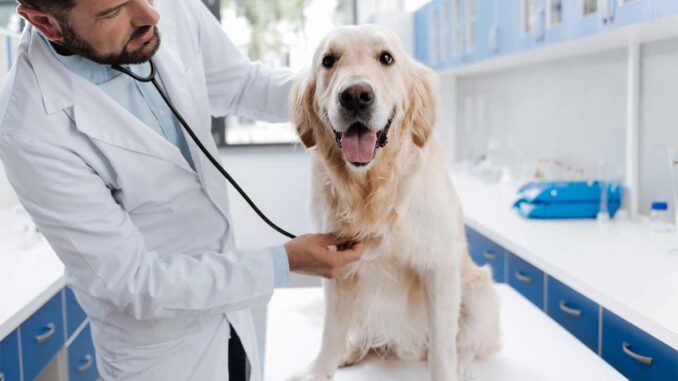
This article was updated on May 1st, 2023

Being able to maintain balance is a pretty basic ability, so losing your footing makes life very difficult. The symptoms of vestibular disease can look pretty scary, and must feel awful for your dog, in particular when symptoms persist over time.
Most dogs recover from vestibular disease or show significant improvements within days. However, incomplete recovery from peripheral vestibular disease is fairly common: studies show that clinical signs can persist or even get worse over time for about 1 out of 3 dogs. This article will cover typical recovery times from vestibular disease and what you should do if your dog is not recovering.
Typical Recovery Time from Vestibular Disease in Dogs
Vestibular disease often arises spontaneously and, depending on the cause, usually resolves itself in the same way.
Most dogs will start to improve within 2 to 4 days and will be totally recovered within two to four weeks. This study found that improvement was observed in 71% of cases after a median of 4 days after diagnosis.
More severe cases may take up to six weeks to be fully recovered. The most dramatic clinical signs of vestibular disease are evident within the first 24-48 hours and will usually begin to improve after this point.
Depending on the cause of vestibular disease, symptoms such as a head tilt and incoordination often disappear within the first 1-2 weeks, and many dogs will go on to make a full recovery within 2-4 weeks.
This is assuming that the cause of the vestibular disease is fairly benign, such as in the case of idiopathic vestibular disease or a middle/internal ear infection.
Dogs Who Do Not Recover Fully from Vestibular Disease
The persistence of clinical signs can also be fairly common, with many dogs not recovering completely from an episode of vestibular disease. Vestibular disease may also get worse for some dogs. This study of 188 dogs with vestibular disease tracked the outcome with a median follow-up time of 12 months and found that:
- Head tilt persisted for 34.5% of dogs (Head tilt is not generally a concern if the dog is otherwise well).
- Symptoms of facial paresis persisted for 28.5% of dogs.
- Incoordination when moving (ataxia) persisted for 4.1% of dogs.
Furthermore, 17.6% of the dogs in the study had recurring clinical signs at least once over the following 12-month period – meaning that even once symptoms resolved, there is a chance that they could recur in the future.
Incomplete recovery from peripheral vestibular disease is most notably common in dogs presenting with cranial nerve deficits and abnormalities detected on MRI.
What To Do If Your Dog Is Not Recovering from Vestibular Disease
If your dog shows no signs of improvement within the first 7 days, or if your dog appears to be getting significantly worse, then the next step is to investigate why this may be.
“A dog that shows no improvement is suspected to have a more sinister underlying cause for their vestibular symptoms, and advanced imaging with CT/MRI scans are likely necessary. These more sinister causes are often grouped together under the term ‘central vestibular disease.’”
Most likely causes
One concern would be a lesion within the brain that had led to the unusual vestibular symptoms seen. This could be anything from inflammation and blood clots (stroke) to a tumor that is affecting the neurons involved in coordinating the vestibular system.
A specialist veterinarian is usually required to investigate further, so talk to your local veterinarian about a referral if necessary.
The most common causes of non-regressing vestibular disease are:
- Ischemic stroke: a blood clot in the brain cuts off blood supply to the nerves supplying the vestibular system.
- Neoplasia: The growth of a tumor that puts pressure on and damages the nerves supplying the vestibular system.
Some dogs that have a stroke will make a quick recovery, and their vestibular symptoms may subside within the first 1-2 weeks. However, if vestibular episodes keep recurring, then further investigations should be carried out.
Many dogs that suffer from strokes have another underlying cause that predisposes them to these repeated strokes, such as increased blood pressure, endocrine disease, blood clotting disorders, or kidney disease.
If this is the case, then blood tests should be performed to help rule some of these causes out.
Neoplasia is another possible cause of worsening vestibular disease, particularly in older dogs. However, this is still a rare cause of vestibular disease. Treatment options for a brain tumor depend upon the location and type of the tumor, but unfortunately, are limited.
Anti-inflammatory medication such as steroids can help to reduce the clinical signs but is by no means a cure. The median survival time for a dog with a brain tumor treated with steroids alone is between 2-4 months. This survival time can be increased through the implementation of chemotherapy and radiotherapy.
Related Posts About Vestibular Disease in Dogs:
 Should You Euthanize A Dog With Vestibular Disease? - After 14 years of working as a vet, I can diagnose some client concerns in an instant. When a client… [...]
Should You Euthanize A Dog With Vestibular Disease? - After 14 years of working as a vet, I can diagnose some client concerns in an instant. When a client… [...] Can Vestibular Disease Kill a Dog? - Vestibular disease arises spontaneously, and, often, resolves itself in the same way. For the most part, vestibular disease is a… [...]
Can Vestibular Disease Kill a Dog? - Vestibular disease arises spontaneously, and, often, resolves itself in the same way. For the most part, vestibular disease is a… [...] Recurrence of Dog Vestibular Disease - In many cases, vestibular disease resolves itself spontaneously: most dogs will start to improve within 2 to 4 days, with 71%… [...]
Recurrence of Dog Vestibular Disease - In many cases, vestibular disease resolves itself spontaneously: most dogs will start to improve within 2 to 4 days, with 71%… [...] How to Feed a Dog with Vestibular Disease - If your dog suffers from vestibular disease, you’ll know how much they can struggle to eat. Many dogs with vestibular… [...]
How to Feed a Dog with Vestibular Disease - If your dog suffers from vestibular disease, you’ll know how much they can struggle to eat. Many dogs with vestibular… [...] Dog Vestibular Disease: a Veterinarian Guide for Dog Owners - Old Dog Vestibular Disease can be triggered by a number of things, including inner ear problems, a collar-related injury, a… [...]
Dog Vestibular Disease: a Veterinarian Guide for Dog Owners - Old Dog Vestibular Disease can be triggered by a number of things, including inner ear problems, a collar-related injury, a… [...]Disclaimer: This website's content is not a substitute for veterinary care. Always consult with your veterinarian for healthcare decisions. Read More.






My 14 yr old Springer has frequent episodes exhibiting vestibular disease through out the day for the past several years. Is there anything that can help her.., she is currently taking Gabopentin 100mg BID
Some dogs will not recover from vestibular disease. Most likely these dogs have a brain tumor or other irreversible neurological issue. A CT or MRI done at a veterinary specialty center may help see the cause of your dog’s vestibular issue. There are also certain supplements that can possibly help with cognitive and vestibular issues – to be discussed with your veterinarian.
Thank you for this informative post! My dog was diagnosed with vestibular disease a few weeks ago, and I’ve been really worried about her recovery. I appreciate the tips on managing her symptoms and knowing when to seek further help. It’s comforting to know we’re not alone in this and that there are steps we can take to support our furry friends.
Thank you for sharing this informative post! It can be so concerning when our furry friends struggle with vestibular disease. I appreciate the tips on monitoring their symptoms and seeking veterinary advice. It really helps to know I’m not alone in this, and that there are steps I can take to support my pup’s recovery.
Thank you for sharing this valuable information! It’s reassuring to know there are steps we can take if our furry friends aren’t recovering as expected. I appreciate the tips on monitoring their symptoms closely and ensuring they have a safe space. It gives me hope and guidance for helping my dog through this challenging time.
Thank you for sharing such valuable information! It’s reassuring to understand that recovery can vary so much. I’ll definitely be more patient and attentive with my dog during this time. Your tips on supportive care are especially helpful!
Thank you for sharing such valuable insights on vestibular disease in dogs. It’s heartbreaking to see our furry friends struggle, and knowing the steps to support their recovery helps a lot. I appreciate your advice on providing a calm environment and keeping them comfortable. I’ll definitely use the tips you suggested and keep an eye on their progress. Fingers crossed for a full recovery!
Thank you for this informative post! I recently went through a tough time with my dog who was diagnosed with vestibular disease, and it was really helpful to read about potential next steps and when to seek further help. I appreciate the insights on how to support my pup during recovery.